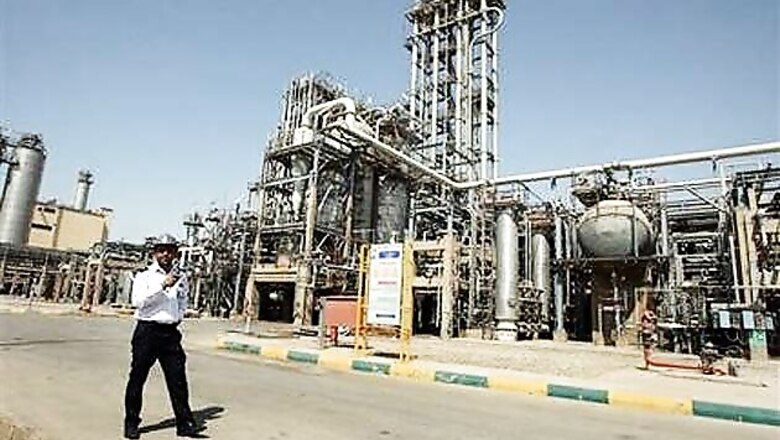
views
Washington: A new package of severe sanctions on Iran's energy, shipping and financial sectors gained strong congressional support on Tuesday as US lawmakers sought to ratchet up the economic pressure in hopes of halting Tehran's suspected nuclear weapons program.
House and Senate negotiators reached agreement on late Monday on legislation that builds on the current penalties directed at financial institutions that do business with Iran's central bank. The new bill would impose sanctions on anyone who mines uranium with Iran; sells, leases or provides oil tankers to Tehran; or provides insurance to the National Iranian Tanker Co., the state-run shipping line.
Iranian officials quickly criticised the latest round of penalties, labeling the economic pressure "warfare" and promising to retool the country's oil-dependent economy.
In an election year, US lawmakers were determined to punish Iran while sending a strong signal of support to Israel amid fears about the Iranian threat to the close Mideast ally. In a separate move, President Barack Obama used his executive authority to impose fresh sanctions on foreign banks in China and Iraq that the US says helps Iran evade the penalties.
The move came as Obama's Republican rival, Mitt Romney, has argued that the President isn't tough on Iran.
The Democratic and Republican leaders in the Senate said on Tuesday they expect swift passage of the latest package of sanctions after a House vote tentatively scheduled for Wednesday.
"It would be better to have that down on the president's desk by the end of the week," Senate Minority Leader Mitch McConnell, R-Ky., told reporters.
The measure has one crucial backer - the powerful American Israel Public Affairs Committee, the pro-Israel lobbying group - and extensive support from Republicans and Democrats.
"That will go a long way," Sen Lindsey Graham, R-SC, said of the AIPAC support. Sen. Bob Menendez, D-NJ, who pushed for the shipping sanctions, called the bill a good move at a critical time.
The latest round of sanctions came as the White House announced separate penalties on banks in China and Iraq that the Obama administration says have helped Iran evade international sanctions.
The new penalties target China's Bank of Kunlun and Iraq's Elaf Islamic Bank. In a statement, Obama says the sanctions make clear that the US will expose any financial institution that assists "the increasingly desperate Iranian regime" to access the international financial system.
Obama is also expanding sanctions on the purchase or acquisition of Iranian petrochemical products. The sanctions are authorised in part for those who provide support to the National Iranian Oil Company and the Central Bank of Iran.
"The congressional efforts can be complimentary to what we're doing," said White House Deputy national Security Adviser Ben Rhodes, who added that administration officials have worked closely with lawmakers on the legislation.
The latest legislation would penalise anyone who works in Iran's petroleum, petrochemical or natural gas sector, or helps Tehran's oil and gas industry by providing goods, services, technology or infrastructure.
Any entity that insures or reinsures investments in Iran's oil sector would be penalized. So would anyone who helps Iran avoid sanctions through reflagging of vessels.
"This legislation and today's executive action are important steps in the right direction, but not the final word on Iran sanctions," said Rep. Howard Berman, D-Calif. "Unless Iran agrees to end its weapons program, we must continue to pursue even tougher measures that would result in crippling sanctions on the Iranian regime."
The United States and Europe argue that depriving Iran of its oil income thwarts its suspected drive for nuclear weapons. Iran has exported 2.5 million barrels of oil a day to Europe, China, India, Japan and South Korea. US officials say the penalties have reduced Iran oil exports to less than 1.8 million barrels a day, costing Tehran about $63 million daily.
The package is the work of Rep Ileana Ros-Lehtinen, R-Fla, the chairwoman of the House Foreign Affairs Committee, and Sen. Tim Johnson, D-S.D, chairman of the Senate Banking Committee, and their staffs who met behind closed doors reconciling a bill the House passed in December and one the Senate approved in May. Johnson said they incorporated a number of provisions sought by proponents of tough sanctions.
The bill would target the Iranian Revolutionary Guard Corps and anyone who assists the paramilitary group, including foreign government agencies.
The bill also would deny visas and freeze assets on individuals and companies that supply Iran with technology that could be used against its citizens, such as tear gas, rubber bullets and surveillance equipment. The bill extends those sanctions on human rights violators to Syria, where President Bashar Assad's regime is accused of a bloody crackdown against protesters.
The bill requires companies that trade on the U.S. stock exchange to disclose any Iran-related business to the Securities and Exchange Commission.
Late last year, Congress overwhelmingly approved sanctions targeting foreign financial institutions that do business with Iran's central bank by barring them from opening or maintaining correspondent operations in the United States. Those sanctions applied to foreign central banks only for transactions that involve the sale or purchase of petroleum or petroleum products.
The new bill expands on those penalties.
The rare display of bipartisanship on the legislation came amid high-stakes talk about the effectiveness of sanctions, which by the numbers alone have reduced Iran's oil exports.
"All the sanctions and diplomacy so far have not set back the Iranian program by one iota," Israeli Prime Minister Benjamin Netanyahu said this past weekend.
Israeli leaders have contemplated a military strike on Iran to stop it from developing nuclear weapons. Iran insists that the uranium enrichment work is for peaceful purposes.
Traveling in the Mideast, Defense Secretary Leon Panetta acknowledged that stiff international sanctions have yet to compel Iran to give up its nuclear ambitions. He insisted that more pressure eventually would lead Iran to "do what's right."
"These sanctions are having a serious impact in terms of the economy in Iran," he told reporters on Monday. "And while the results of that may not be obvious at the moment, the fact is that they have expressed a willingness to negotiate (with the US, Britain, France, Germany, Russia and China) and they continue to seem interested in trying to find a diplomatic solution."
Several proponents of tough sanctions, such as Rep. Ted Deutch, D-Fla., Sen. Mark Kirk, R-Ill, Rep Robert Dold, R-Ill, and Rep Brad Sherman, D-Calif, had pressed negotiators to blacklist Iran's energy sector, labeling it a "zone of proliferation concern." That would effectively ban all business with Iran. But the bill says the president should impose sanctions and the provision is non-binding.
Sherman called the compromise bill "a step forward."
Kirk welcomed the inclusion of several other provisions that he had pushed for. "It is time for the United States to make clear we stand squarely with the Iranian people against their oppressors," he said in a statement.




















Comments
0 comment